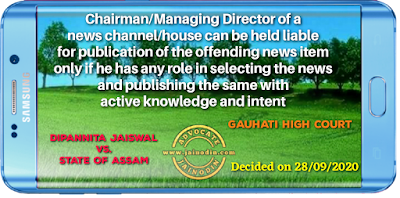If it appears impossible to convict accused inspite of witnesses are presumed to be true without any cross examination, the accused deserves to be discharge
The Hon'ble Supreme Court in the case of Manjeet Singh Khera Vs. State of Maharashtra: 2013 (9) SCC 276 held as under:
"........8. The Court also noticed that seizure of large number of documents in the course of investigation of a criminal case is a common feature. After completion of the process of investigation and before submission of the report to the Court under Section 173 Cr.P.C, a fair amount of application of mind on the part of the investigating agency is inbuilt in the process. These documents would fall in two categories: one, which supports the prosecution case and other which supports the accused. At this stage, duty is cast on the investigating officer to evaluate the two sets of documents and materials collected and, if required, to exonerate the accused at that stage itself. However, many times it so happens that the investigating officer ignores the part of seized documents which favour the accused and forwards to the Court only those documents which supports the prosecution. If such a situation is pointed out by the accused and those documents which were supporting the accused and have not been forwarded and are not on the record of the Court, whether the prosecution would have to supply those documents when the accused person demands them? The Court did not answer this question specifically stating that the said question did not arise in the said case. In that case, the documents were forwarded to the Court under Section 173(5) Cr.P.C. but were not relied upon by the prosecution and the accused wanted copies/inspection of those documents. This Court held thatit was incumbent upon the trial court to supply the copies of these documents to the accused as that entitlement was a facet of just, fair and transparent investigation/trial and constituted an inalienable attribute of the process of a fair trial which Article 21 of the Constitution guarantees to every accused. We would like to reproduce the following portion of the said judgment discussing this aspect:"21.The issue that has emerged before us is, therefore, somewhat larger than what has been projected by the State and what has been dealt with by the High Court. The question arising would no longer be one of compliance or non- compliance with the provisions of Section 207 Cr.P.C. and would travel beyond the confines of the strict language of the provisions of Cr.P.C. and touch upon the larger doctrine of a free and fair trial that has been painstakingly built up by the courts on a purposive interpretation of Article 21 of the Constitution. It is not the stage of making of the request; the efflux of time that has occurred or the prior conduct of the accused that is material. What is of significance is if in a given situation the accused comes to the court contending that some papers forwarded to the court by the investigating agency have not been exhibited by the prosecution as the same favours the accused the court must concede a right to the accused to have an access to the said documents, if so claimed. This, according to us, is the core issue in the case which must be answered affirmatively. In this regard, we would like to be specific in saying that we find it difficult to agree with the view taken by the High Court that the accused must be made to await the conclusion of the trial to test the plea of prejudice that he may have raised. Such a plea must be answered at the earliest and certainly before the conclusion of the trial, even though it may be raised by the accused belatedly. This is how the scales of justice in our criminal jurisprudence have to be balanced."[Para No.63]


